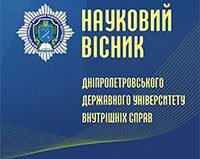Olha STANINA
STANINA O. (2022), FEATURES OF THE FUNCTIONING OF A SMALL BUSINESS IN THE CONDITIONS OF THE ENERGY CRISIS IN UKRAINE; Scientific Bulletin of Dnipropetrovsk State University of Internal Affair, Special Issue №2, 531-536
DOI: 10.31733/2078-3566-2022-6-531-536
ABSTRACT. The hostilities in Ukraine, which continue to take place on its territory, have currently led to the emergence of major problems with electricity – the emergence of a real energy crisis. Under such conditions, enterprises are forced to look for a new ways and discover effective approaches to their functioning. The operations of a small business in Ukraine has always had a large number of problems that needed to be solved as soon as possible: complex taxation system, difficult relations with the law enforcement agencies, actions of state regulators and local self-government bodies, etc. All of these complicates the development of a small business in Ukraine, but the situation related to the energy crisis, which is dangerous for the country’s economy, and which was affected by the military actions deployed on its territory, has become even more difficult at the moment.
The food sector is in a particularly critical situation, in which the presence or absence of electricity directly affects the level of income and, thereby, the economic stability of the enterprise. The situation is further complicated by the fact that in this case companies are dealing not only with a risk that can be foreseen and at least somewhat predicted, but with uncertainty that depends on a whole series of factors, the probability of which is, in fact, unclear. Making decisions under conditions of uncertainty, it would be better for a manager not to rely on his own feelings about how likely this or that event is, since people have a tendency to increase the significance of those events that are unlikely and reduce the probability of those events that have high probability. The situation, which has not been in favor of the country’s economy, requires great caution and foresight when any decisions are making.
Keywords: small business, uncertainty, energy crisis, economic stability, food industry.
- References:
- Slovnyk ukrayinsʹkoyi movy. Akademichnyy tlumachnyy slovnyk (1970-1980) [Dictionary of the Ukrainian language. Academic explanatory dictionary (1970-1980)]. URL : http://sum.in.ua/s/stijkyj. [in Ukr.].
- Ponomarenko, T. V. (2016) Otsinyuvannya ekonomichnoyi stiykosti pidpryyemstva na osnovi vartisnoho pidkhodu [Evaluation of the economic sustainability of the enterprise based on the cost approach]. Ekonomichnyy analiz. Vol. 24, № 2, pp. 106-113. [in Ukr.].
- Arefʺyeva, O. V., Horodyansʹka, D. M. (2008) Ekonomichna stiykistʹ pidpryyemstva: sutnistʹ, skladovi ta zakhody z yiyi zabezpechennya [Economic sustainability of the enterprise: essence, components and measures to ensure it]. Aktualʹni problemy ekonomiky. № 8, p. 83−90. [in Ukr.].
- Buhay, V. Z., Omelʹchenko, V. M. (2008) Analiz ta otsinka Finansovoyi stiykosti pidpryyemstva [Analysis and evaluation of the financial stability of the enterprise]. Derzhava ta rehiony. № 1, pp. 34−39. [in Ukr.].
- Tretyna biznesiv konstatuyutʹ znyzhennya dokhodu bilʹshe nizh na polovynu – doslidzhennya [A third of businesses report a decrease in income by more than half – research]. Gradus Research. URL : https://rau.ua/novyni/stijkist-gradus-research/. [in Ukr.].
- Rybalʹchenko, L. V., Ryzhkov, E. V., Kosychenko O. O. (2019) Vplyv tinʹovoyi ekonomiky na ekonomichnu bezpeku Ukrayiny [The influence of the shadow economy on the economic security of Ukraine]. Naukovyy visnyk Dnipropetrovsʹkoho derzhavnoho universytetu vnutrishnikh sprav. № 2, pp. 175-183. [in Ukr.].
- Neklesa, O. V., Sydorova, E. O., Paleshko, Ya. S. (2021) Finansovyy kontrolʹ yak instrument v podolanni koruptsiynykh proyaviv [Financial control as a tool in overcoming corruption manifestations]. Naukovyy visnyk Dnipropetrovsʹkoho derzhavnoho universytetu vnutrishnikh sprav. № 1, pp. 326-333. [in Ukr.].
- TOP-5 predmetiv skarh: Dynamika pokaznykiv za 2015-2021 roky (%) [TOP-5 subjects of complaints: Dynamics of indicators for 2015-2021 (%)]. URL : https://boi.org.ua/chart/top-5-subjects-of complaints/. [in Ukr.].
- Foksha, L. V. (2021) Mekhanizmy pidtrymky maloho ta serednʹoho biznesu v Ukrayini v umovakh pandemiyi [Mechanisms for supporting small and medium-sized businesses in Ukraine in the context of a pandemic]. Verkhovenstvo prava: doktryna i praktyka v umovakh suchasnykh svitovykh vyklykiv: materialy Mizhnar. nauk.-prakt. konf. (m. Dnipro, 25 lyut. 2021 r.). Dnipro : DDUVS, pp. 168- 170. [in Ukr.].
- Munʹko, A. Yu., Treshchov, M. M. (2020) Ukrayina v sviti: sotsialʹno-ekonomichnyy vymir [Ukraine in the world: socio-economic dimension]. Naukovyy visnyk Dnipropetrovsʹkoho derzhavnoho universytetu vnutrishnikh sprav. № 2, pp. 327-335. [in Ukr.].
- Greenspan, A. (2013) The Map and the Territory: Risk, Human Nature, and the Future of Forecasting. Penguin Press, 400 p.
- Stanina, O. (2022) Vypusk produktu v umovakh nevyznachenosti: stratehiya ta metody [Product release in conditions of uncertainty: strategy and methods]. Naukovyy visnyk Dnipropetrovsʹkoho derzhavnoho universytetu vnutrishnikh sprav. № 2, pp. 356-362. [in Ukr.].
